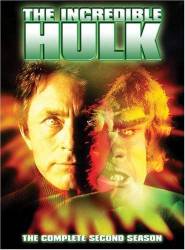
The Incredible Hulk (1978)
0 revealing mistakes in show generally
Starring: Bill Bixby, Lou Ferrigno, Jack Colvin, Michael Santiago
I'm afraid there's nothing listed for this season. Add something here!
Continuity mistake: When the Hulk throws the tire during his second transformation, the first shot shows a horizontal trajectory but the second shot shows a 45 degree angle trajectory, which makes the tire land much further than expected.
David Banner: I love you, Elaina. I think you loved me too. Although you never said it.
Trivia: Bill Bixby refused to let his son watch the show as he was concerned his son would be scared seeing his father change into a green creature.
Question: In this version of the character, why is he named David Banner instead of Bruce Banner?
Join the mailing list
Separate from membership, this is to get updates about mistakes in recent releases. Addresses are not passed on to any third party, and are used solely for direct communication from this site. You can unsubscribe at any time.
Check out the mistake & trivia books, on Kindle and in paperback.




Chosen answer: Bruce has always been the character's middle name. In the comics he is Robert Bruce Banner, here he is David Bruce Banner. Apparently the executives behind the show preferred the name David.